
Joanne McQuarrie, Local Journalism Initiative Reporter | [email protected]
The Alberta government has cancelled 11 coal leases and paused future sales after receiving pushback for rescinding a 1976 policy that protected the eastern slopes of the Rocky Mountains.
But many individuals and groups, including the Alberta Wilderness Association (AWA) and the Canadian Parks and Wilderness Society (CPAWS), still want to know who is exempt from the pause, and have outlined environmental hazards with coal mining.
“As a mother and an Albertan, I have a duty to act and do all I can to protect the eastern slopes of the Rockies,” said Jasperite Jenna McGrath. “I can't imagine in 10 years if my children are asking me what I tried to do and I couldn't give them an answer.”
She has written letters to Environment and Parks Minister Jason Nixon and Premier Jason Kenney, and signed petitions from CPAWS and change.org.
McGrath, a municipal councillor, also urged council to send a letter about the province's decision. That matter is now on council's Feb. 2 agenda.
“The water supply is a huge issue,” McGrath said. “We're all affected, no matter if it's in the eastern slopes.”
Energy Minister Sonja Savage's announcement about the pause on Jan. 18 does not reinstate the 1976 Coal Policy that offered absolute protection to affected lands, said Dr. Ian Urquhart, Alberta Wilderness Association Conservation Director.
“The protection only will be guaranteed if the Coal Policy's de facto prohibition on any surface mining in Category 2 lands is revived,” Urquhart said in an email.
Coal is a major geologic source of a naturally-occurring element known as selenium.
“Environment and Climate Change Canada offered a very devastating observation about selenium with respect to the Grassy Mountain project on the first day of the public hearing,” Urquhart said.
The Grassy Mountain project includes the construction, operation and reclamation of an open-pit metallurgical coal mine near Crowsnest Pass, about seven kilometres north of Blairmore in southwest Alberta.
“The concern with selenium is that, once it's in the aquatic environment, there will uptake of the selenium into aquatic organisms,” Urquhart added. “That uptake into fish will lead to deformities, birth defects and reproductive failures.”
Urquhart cited a 2014 expert report from Environment Canada concluding that increases in selenium pollution in B.C.'s Elk River would eventually produce “a total population collapse of sensitive species like the westslope cutthroat trout.”
“We are gambling with the future of our children and already endangered species such as westslope cutthroat trout if we allow coal mining in Alberta's headwaters,” he said.
Urquhart noted the high emissions from mining activities. The steel sector also accounts for nearly 10 per cent of global greenhouse emissions, with the metallurgical coal used in conventional steel making a significant contributor to greenhouse gas emissions.
Savage said in her announcement the decision has no impact on existing coal projects currently under regulatory review. Urquhart wants the minister to provide a list of projects that will be exempt and what projects she considers to be “currently under regulatory review.”
“Tens of thousands of hectares of coal leases already existed in the Rockies and Foothills before the December lease sales,” Urquhart said. “The cancelled leases only amount to a very tiny sliver of the lands (1,853 hectares) where the government would allow surface-mining in the absence of the Coal Policy.”
CPAWS parks co-ordinator Chris Smith said they also had concerns about the removal of the Coal Policy.
“There is a lack of consideration on the cumulative effects of these mining projects at a landscape level,” said Smith in an email.
“Since 1976, the Coal Policy has provided important land use zoning frameworks, which have informed management and development of coal mines along the eastern slopes region of Alberta. With the policy removed, there is a lack of big-picture planning and monitoring on how these open-pit coal mine developments will cumulatively impact the ecology of the mountains and foothills of the Rocky Mountains.”
Smith said increasing levels of human disturbance on the edges of the Rocky Mountain national parks is having detrimental impacts on wildlife and their habitat, including species within the national parks.
“Wildlife, especially those that can move great distances like grizzly bears and caribou, utilize habitat on both sides of our national park boundaries,” Smith said. “What happens just across the border can disrupt their habitats, isolate and fragment populations and place additional stress on (them).”
This matter is one of governance, said Kevin Van Tighem. Based in Canmore, Van Tighem has worked in landscape ecology and conservation biology in the Waterton Lakes, Banff and Jasper national parks, and is the author of conservation books.
When the 1976 Coal Policy was developed, Van Tighem said, “The government of the day did a lot of homework, including public consultation. When it was (rescinded) on June 1, 2020, it was done without… consulting the public.”
Van Tighem said there's concern about opening mountains up to strip mining.
“There's also the issue about principle and good governance,” he added. “If this is how they operate, how can they be trusted?”
Peter Brodsky, spokesperson for Minister Savage, said there is no specified timeline for the pause.
“It is important to note that securing a lease does not mean that there is going to be a mine,” Brodsky said, noting how a comprehensive regulatory review would still be needed even if a coal lease was obtained.
“The rescission of the coal policy did not make any area available to coal development that was previously restricted,” he added. “Protected and environmentally sensitive areas will not be developed.”
West Yellowhead MLA Martin Long reiterated how “this decision does not affect coal developments currently under regulatory review.”
“This regulatory process is overseen by the Alberta Energy Regulator (AER) - an independent body that carefully assesses mining projects and holds extensive public consultations that are crucial for prudent regulatory oversight,” Long said.



